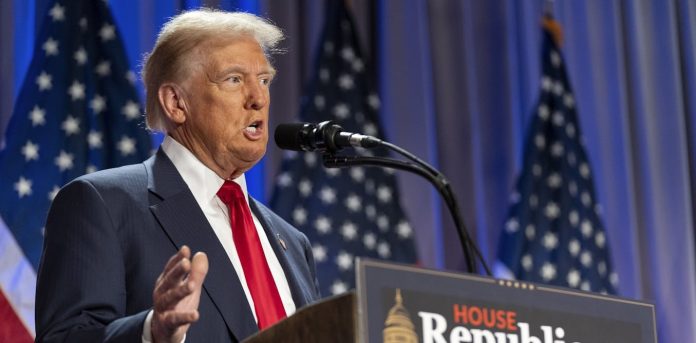2024 presidential election: U.S. equities surged, then retreated, after Trump’s victory
United States presidential elections consistently draw global attention due to their far-reaching impacts on both the American and global economies. The 2024 election was no exception, standing out as a particularly significant event that drew unprecedented scrutiny.
President-elect Donald Trump’s victory has been seen as an inflection point signalling a dramatic shift in the political and economic landscape both of the U.S. and beyond. Trump’s return to office is expected to bring a mix of policy changes that could reshape market dynamics, regulatory frameworks and international trade.
Reactions from the financial community have been a mix of hope and concern. On one hand, some investors and market participants have expressed optimism about potential economic policies including stimulus measures, tax reductions and deregulation.
On the other hand, Trump’s return to office raises concerns about trade policies, geopolitical risks and policy unpredictability. Trump’s previous administration was marked by trade wars and an “America First” approach that strained relationships with trading partners.
Against this backdrop, our recent study, which hasn’t been peer-reviewed yet, analyzed the U.S. stock market’s reaction to the election outcome. By examining how different types of firms responded to this political shock, our findings offer useful guidance for investors, analysts and regulators alike.
Elections and the stock market
Political events, especially presidential elections, have long been associated with fluctuations in stock market behaviour. Historically, U.S. markets have shown a tendency for positive performance during election years.
From 1928 to 2016, the S&P 500 Index saw more positive performance than negative, with 83 per cent of elections providing positive performance.
Despite this positive historical trend, the relationship between these events and market volatility is not always straightforward. A study examining the effects of presidential election announcements on Egyptian and U.S. markets found no statistically significant impact on stock market volatility in either market.
Instead, both markets demonstrated an increase in abnormal returns coupled with a decrease in volatility post-election, suggesting both election outcomes were efficiently absorbed and reflected in stock prices.
For investors, this study highlights the importance of focusing on long-term fundamentals rather than overreacting to election-related noise.
Abnormal equity returns
We analyzed the impact of the 2024 U.S. presidential election on equity markets using an event study methodology spanning from three days prior to three days after election day. It focused on the variations in response across firms of different sizes and various industry sectors.
The results indicate significant abnormal returns in U.S. equities during the immediate post-election trading session after Donald Trump’s victory was confirmed.
However, this initial surge was followed by a reversal, indicating that investor sentiment fluctuated over time. A closer look at firm-level data shows that small-cap equities with higher domestic exposure experienced the most positive abnormal returns.
Sector-specific analysis reveals varied responses: the energy sector saw substantial gains, likely due to anticipated regulatory shifts, while the chemical sector had more moderate post-event reactions. These findings underscore the complex and varied responses the market can have to significant political developments.
What does this mean for Canadians?
What do our findings mean for Canadians? The real answer is that it depends. From a cautionary perspective, the initial signs aren’t promising.
The Canadian dollar recently fell to a four-year-low against the U.S. dollar, which could lead to higher inflation since many products are imported using U.S. currency. This could compel the Bank of Canada to delay interest rate cuts or even pause them altogether, potentially cooling the Canadian economy.
Trump’s proposed 10 per cent across-the-board tariff — and possible retaliatory tariffs from Canada — would be devastating for the Canadian economy, according to TD economist Marc Ercolao.
Then there’s the chance that Trump’s plan for mass deportations could lead to increased asylum claims from people crossing into Canada. That could have a negative impact on the Canadian economy by straining the country’s resources.
However, there’s still room for optimism. Many Canadians invest in the U.S. stock market; Canadian investors acquired $44.5 billion of U.S. equity securities in 2024, according to Statistics Canada.
Based on our findings, U.S. stock markets took this victory positively, which, in turn, could help many Canadians, especially those with Registered Retirement Savings Plans. There’s also hope that Trump’s aggressive trade threats were merely election rhetoric and Canada could still avoid being drawn into a broader tariff war.
Still, there’s no such thing as a “free lunch.” The stock market’s post-election hot streak may have longer repercussions for both the environment (for example, increased fracking and discontinuing the electric vehicle tax credit) and the global economy.![]()
Ashrafee Tanvir Hossain, Full Professor, Faculty of Business Administration, Memorial University of Newfoundland; Mostafa Hasan, Professor, Department of Accounting and Corporate Governance, Macquarie University, and Shaker Ahmed, Lecturer in Finance, University of Surrey
This article is republished from The Conversation under a Creative Commons license. Read the original article.



